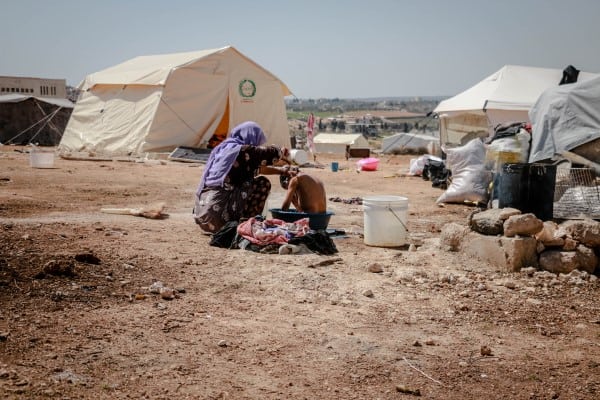This page contains affiliate links. This means if you a follow a link and make a purchase, at no additional cost to you, Humanitarian Careers will receive a commission. Thank you for supporting the site.
Every year, millions of dollars are spent worldwide on humanitarian aid. There is also a massive global aid industry employing tens of thousands of people. We see humanitarian organisations raise funds through adverts and campaigns. We also hear about humanitarian responses on the media. But really, what justifies all this? Why is humanitarian aid actually important?
Humanitarian aid is important because it provides life-saving assistance to people affected by conflicts, disasters and poverty. Humanitarian aid is vital in reducing the impact of crises on communities, helping recovery and improving preparedness for future emergencies.
Now we have an overview of how crucial humanitarian assistance is, let’s breakdown the main reasons international aid is so important…
It Save Lives
The first reason why humanitarian aid is important is because it saves lives. When huge numbers of people are affected by disasters, crises or conflicts, humanitarian agencies mount a response. The main aim of a humanitarian response is to prevent loss of life and this is the principle aim of humanitarian aid.
Humanitarian aid plays a vital role in limiting the impact, suffering and loss of life caused by crises. Humanitarian actor’s set-up and run a range of projects aimed at meeting people’s basic needs and assisting recovery. It’s hugely important that populations hit by disasters or conflicts receive humanitarian aid.
It is possible through effective humanitarian action to significantly reduce the impact of disasters on communities. Aid is vitally important in reducing the number of deaths, especially after the crisis’s onset. A well-funded and resourced humanitarian response plays a crucial role in saving lives and this is probably the biggest reason aid is important.
It’s a Key Part of Emergency Responses
Humanitarian aid is an important part of an emergency response to crises. When countries are hit by disasters, urgent responses are needed to save lives and provide for the basic needs of people. Humanitarian actors play a crucial role in these urgent actions and the aid they provide is fundamental to crises responses.
Responses to humanitarian emergencies involve the mobilisation of enormous resources. Many humanitarian actors, such as the UN and major NGOs pre-position aid supplies so as to be able to deploy aid rapidly into crises zones. This ability to respond with urgent aid is a major reason humanitarian action is important.
Humanitarian aid can cover a huge range of needs of crises affected populations. Aid agencies abilities to provide for the needs of communities affected by floods, famines, diseases, earthquakes and wars is vital in reducing suffering. Successful humanitarian responses show how vital international aid is.
Crucial For Ensuring Food Security and Nutrition
International aid is crucial in helping famine affected populations survive and recover. It is crucial that aid is mobilised when areas are hit by famines. Humanitarian aid is key to saving lives, ensuring food supplies and helping areas recover that are affected by food insecurity.
Another way that humanitarian aid is important is in improving childhood nutrition. Millions of children around the world are in urgent need of food assistance and improved nutrition. NGOs run humanitarian projects that play a key part in improving nutritional outcomes for children living in poverty.
Humanitarian aid is also key in preparing food and nutritional supplies before disasters strike. The pre-positioning of food supplies that can be moved quickly into areas affected by crises is vitally important. Being able to mount a rapid food security and nutrition response saves lives and helps affected communities recover.
Humanitarian Assistance Can Provide Protection
Over the previous two decades, humanitarian aid has focused more on the protection of vulnerable people. When disasters hit populations, vulnerabilities increase. International aid is important because it allows humanitarian actors and local organisations to run projects that can protect people who are especially vulnerable as a result a crisis.
Humanitarian protection works to ensure all people affected by crises are able to access their full rights. This is especially vital for population groups such as women, children, disabled or minorities. Humanitarian aid is important because it allows for work to be done to protect such vulnerable groups.
In order to ensure all people retain access to their rights during a humanitarian emergency, it is important that international aid actors are able to mobilise and operate effectively. As impartial and neutral organisations, humanitarian agencies are vital in protecting marginalised individuals and groups. This is a major example of the importance of humanitarian work.
Humanitarian Aid Online Courses
If you want to learn more about humanitarian aid, including why it is important, we highly recommend the online course When Disaster Meets Conflict by the Erasmus University Rotterdam. We think it’s one of the best overviews of the humanitarian sector. Follow the link to the course’s page for more information.
The International Humanitarian Law Theory and Practice online course offered by Leiden University in the Netherlands provides a fantastic theoretical overview of humanitarianism. We think it’s one of the top online courses for those who want to understand the basics of international humanitarian law. Click the link to visit the course’s page for more information.
If you are looking to work in humanitarian aid, we highly recommend the online course International Humanitarian and Development Careers. We think it provides a great overview of the humanitarian sector and gives valuable insights for those searching for jobs in humanitarian aid. Follow the link to the course’s page for more information.
Offers Shelter During Crises
Humanitarian aid is also important as it provides shelter. When disasters and conflicts hit populations often huge numbers of people lose their homes. Humanitarian assistance is urgently needed to provide temporary shelter to these people. Safe and secure shelter is vital for crises affected people and international aid plays a major role in providing this.
Alongside providing crises affected people with temporary shelter, humanitarian aid is important in giving people the resources to rebuild their home after a disaster. By distributing the resources, materials and labour needed, foreign aid is crucial in helping people rebuild their lives and livelihoods.
In a humanitarian crisis, shelter is one of the top needs of populations. People need shelter in order to be safe, protected and to begin to regroup their community. Shelter reconstruction is vital to rebuilding societies after a disaster. Humanitarian aid plays a vital role in shelter provision.
It Helps Rebuild and Develop Livelihoods
When people are hit by crises, conflicts or disasters, they lose their livelihoods. Humanitarian aid is important because it can assist people with rebuilding their livelihoods and business, returning to being able to provide for their family and community. Livelihoods projects are a key part of many humanitarian responses.
Without humanitarian assistance, many communities may never recover economically from a crisis. Humanitarian aid can play a vital part in helping people recover through projects designed to re-establish businesses and provide jobs. This is one of major ways international aid is important.
There are many types of humanitarian livelihood projects. These include cash distributions, cash for work, business micro-finance and providing resources and tools for livelihood development. Helping people to recover their work, jobs and business after a disaster is crucial if communities are to recover and humanitarian aid plays a vital part in this.
Gives People in Need Clean Water and Sanitation
Clean drinking water and proper sanitation are significant needs of populations affected by humanitarian emergencies. Foreign aid plays a vital role in addressing these needs. There are many humanitarian actors that specialise in the provision of clean water and sanitation management to crises affected populations.
Proper water and sanitation arrangements for communities save lives and limit the spread of disease. This makes humanitarian aid crucial. Without humanitarian assistance, deaths from lack of water, water born diseases and poor sanitation would massively increase in poor communities and countries affected by humanitarian crises.
Ensuring people have access to clean water and good sanitation as part of an emergency response is one of the most important reasons for humanitarian aid. Humanitarian WASH, the area covering water, sanitation and hygiene also covers key environmental hygiene areas such as garbage and waste disposal – crucial areas in humanitarian responses.
Helps Recovery After a Disaster
Humanitarian aid is important in helping people recover from disasters. Communities hit by natural disasters, crises or conflicts suffer severe disruption. This affects lives, livelihoods and the cohesion of societies. Rapid recovery is vital for people to return to their lives and for communities to heal. International aid plays a vital part in this.
The first phase of a humanitarian response is known as ‘early recovery’. In many crises the United Nations will activate the early recovery cluster to coordinate humanitarian aid. Early recovery focuses on immediate assistance to people, whilst also putting structures in-place to improve resilience. The early recovery phase is a vital part of humanitarian work.
Following the initial response and early recovery, humanitarian aid plays a key part in continuing to help people rebuild after a disaster. Often, humanitarian projects will transition towards more longer-term development work, meaning communities are better able to withstand future crises. International aid is crucial in all phases of disaster recovery.
Humanitarian Aid is Vital for Global Health
There are a wide range of ways that humanitarian aid plays a key role in global health. Firstly, humanitarian actors run medical and mental health projects assisting displaced people and those affected by crises. Humanitarian and development organisations also run important health projects for marginalised communities and people living in poverty.
The second important role international aid plays in global health is in tackling pandemic outbreaks. Many countries do not have the resources to control disease outbreaks and require humanitarian assistance to do so. This is one-way humanitarian aid is highly important as it can help to control pandemics before they spread worldwide.
The third way that humanitarian aid is crucial for global health is through vital medical service delivery, such as vaccinations. Again, many countries lack the capacities to vaccinate their populations. Foreign aid is used to reach many communities, preventing wider disease outbreaks, and improving the health of societies around the world.
Works to Ensure Preparedness
One-way humanitarian aid is important is through preparedness for future crises. Humanitarian preparedness takes many forms, including the pre-positioning of aid supplies, assisting vulnerable communities to prepare and building systems to improve future responses. Preparedness saves lives when crises hit and international aid plays a vital role in effective crises preparedness.
Preparedness for humanitarian emergencies means having mechanisms in-place so that assistance can be provided quickly and effectively. Humanitarian aid is important in helping international organisations, NGOs and governments properly prepare for upcoming crises. Populations in disaster prone areas must become prepared for such events and humanitarian aid plays an important role in ensuring this.
Funding provided through humanitarian agencies have helped crises prone countries develop early warning systems, disaster risk reduction frameworks and better crises preparedness. International aid is crucial to building effective systems that can reduce the impact of future disasters.
Builds Capacity
A very big reason why humanitarian aid is important is that it helps build local capacity. Capacity building has become a major part of the aid industry in recent years. This is where a focus is placed on developing the skills, knowledge and resources of local actors so that they are better able to respond to future crises.
Humanitarian actors ensure capacity building through several ways. These include partnering with local organisations, hiring national staff and delivering trainings. The aim of capacity building as part of a humanitarian response is to reduce reliance of international assistance and allow communities that are affected by disasters to better help themselves.
Effective capacity building means in future humanitarian aid can be delivered by local actors. This will further increase its impact and reach as resources will be managed nationally by organisations fully embedded in the local context. In many places, humanitarian assistance places a vital role in increasing capacity towards this aim.
Key for The Fight Against Climate Change
Climate change is one of the biggest challenges of our times and humanitarian aid is important in mitigating it’s impacts. As the globe warms, huge areas of the world are going to change, affecting crops, livelihoods and communities. Humanitarian aid is needed to help societies meet the challenges of climate change and transition to avoid its affects.
Another aspect of climate change that international aid will play a vital role in is assisting people affected by the conflicts that are likely to arise. As resources become scarce, such as arable land, water or food, people will begin to fight over them. We have already seen this in Darfur and Syria. These conflicts are likely to cause mass displacement and humanitarian aid will be important part of assisting.
As global warming has a greater and greater impact, droughts, food shortages and a reduction in farmable land are all going to occur. These are also likely to hit some of the poorest people on earth the hardest. Humanitarian aid is going to be crucial in limiting the effects of climate change and developing technologies to mitigate its impact.
Provides Education to Children in Need
Millions of children around the world do not have access to education, either as a result of disasters, conflicts or poverty. Humanitarian actors play a vital part in providing schooling to children around the world who otherwise would not have be able to gain an education. The education humanitarian projects provide is another major reason foreign aid is important.
Education is crucial to a child’s development. It’s also important for societies to develop. Educational humanitarian aid is provided to refugees and displaced children, as well as children from marginalised communities and those living in poverty who would otherwise be unable to attend school. Humanitarian assistance allows millions of children to attend school who otherwise would not.
Another important way humanitarian aid helps children access education is through what is known as ‘education in emergencies’. When crises hit communities, children’s schooling is disrupted. Humanitarian actors work to ensure children’s education can continue whilst disaster responses are ongoing and assist with rebuilding schools so children can return to learning. These projects are another big example of how important humanitarian aid is.
If you want to learn more about humanitarian aid, explore our list of the top humanitarian aid online courses here.





